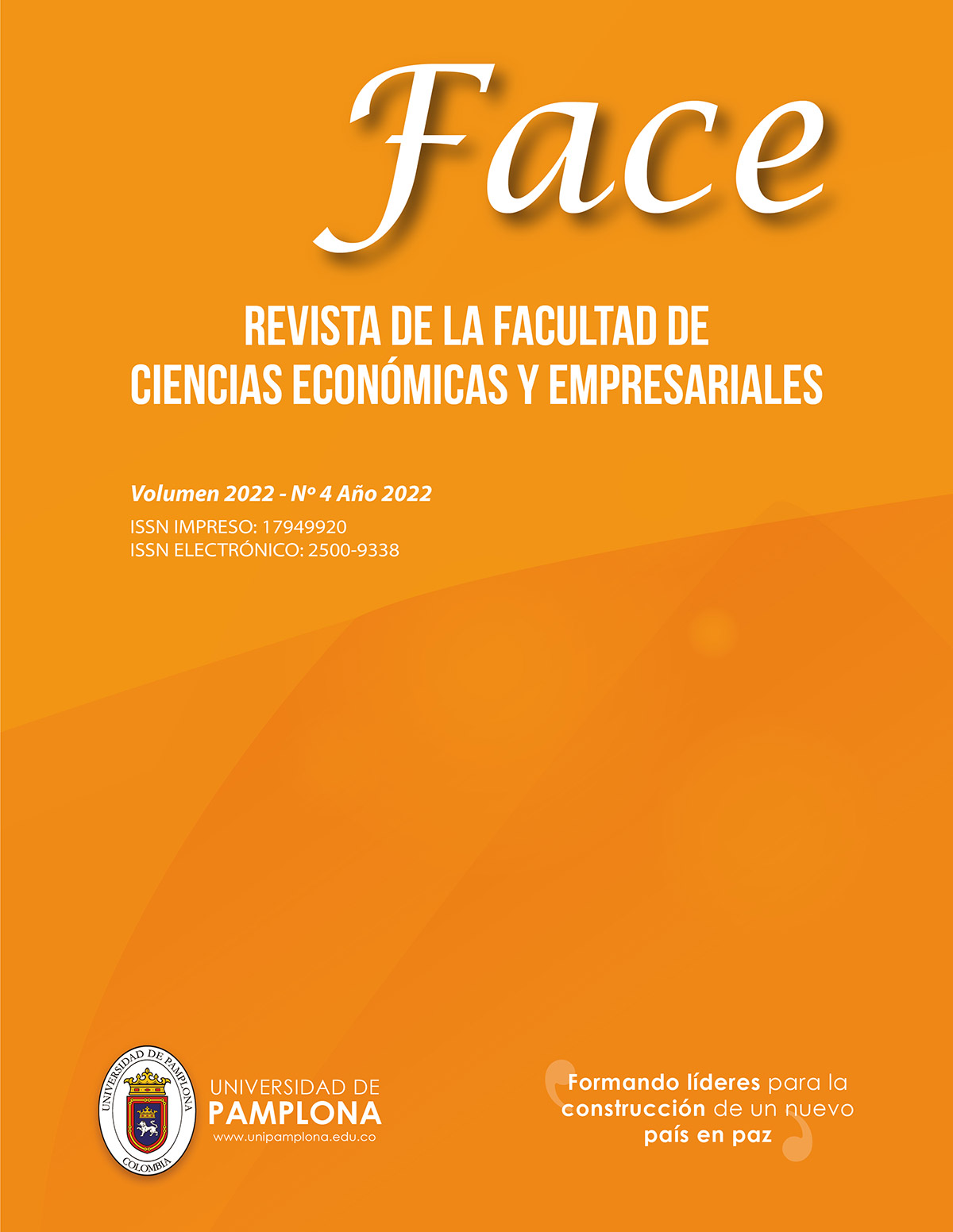Medidas de ajuste a una nueva realidad de vida tomadas por los consumidores colombianos y mexicanos ante la llegada del covid-19
DOI:
https://doi.org/10.24054/face.v22i4.2294Palabras clave:
Covid-19, conducta de ajuste, ocio, compra racional, optimismoResumen
Sin duda alguna, toda nueva situación genera en los sujetos desajustes a nivel emocional, racional, conductual, fisiológico entre otros, conllevando en ocasiones a crisis en sus vidas, por ende, el ser humano, siempre tiende a buscar el equilibrio encaminado a eliminar la sensación de incertidumbre. Ante la llegada del Covid-19 la humanidad en general se vio avocada a implementar medidas de contingencia en busca de recobrar el equilibrio perdido.
Con base en lo anterior, esta investigación persigue determinar cuáles fueron esas medidas de ajustes adoptadas por los consumidores mexicanos y colombianos como ajuste a una nueva realidad de vida, considerando que este hecho puede servir como apoyo a los profesionales del marketing en su planeación estrategia, y ser una puerta para nuevas investigaciones, dado que el trabajo fue realizado de forma temprana, a tan solo dos meses de haber sido oficializado el contagio y tomando medidas gubernamentales contingentes al respecto como el confinamiento.
Descargas
Referencias
Adsuara, L. Candel, V. Reina, N. (2016). Intervención individual en duelo. Hospital Arnau de Vilanova. Valencia. Disponible en:http://www.seom.org/seomcms/images/stories/recursos/sociosyprofs/documentacion/manuales/duelo/duelo12.pdf
Avia, D. & Vázquez, C. (1999). Optimismo inteligente. Alianza Editorial, Madrid.
Bagozzi, R., & Yi, Y. (1988). On the evaluation of structural equation model. Journal of the Academy of Marketing Science, 16 (1), 74-94. https://doi.org/10.1007/BF02723327
Baumann, Szabo y Johnston, (2017), Comprender las preferencias alimentarias de las personas de nivel socioeconómico bajo Revista de cultura del consumidor19 (1): 146954051771778 DOI:10.1177 / 1469540517717780https://www.researchgate.net/publication/322161375_Understanding_the_food_preferences_of_people_of_low_socioeconomic_status
Burgos, Paris, Salcedo., & Toledo (2020). Gobernanza universitaria en tiempos de crisis socio sanitaria: experiencias de directivos chilenos. Vol. 18 Núm. 35. Disponible en:https://revistas.usantotomas.edu.co/index.php/hallazgos/issue/view/577
Cassia Nakano, T. (2020). Crisis, desastres naturales y pandemias: contribuciones de Psicología Positiva. Ciencias Psicológicas, 14(2). Disponible en:http://www.scielo.edu.uy/scielo.php?pid=S168842212020000270301&script=sci_arttext&tlng=en
Chen, Y., Rajabifard, A., Sabri, S., Potts, K. E., Laylavi, F., Xie, Y., & Zhang, Y. (2020). A discussion of irrational stockpiling behaviour during crisis. Journal of Safety Science and Resilience, 1(1), 57-58. Disponible en:https://www.sciencedirect.com/science/article/pii/S2666449620300037
Flórez, S. D. (2002). Duelo. In Anales del sistema sanitario de Navarra (Vol. 25, pp. 77-85). Disponible en: https://doi.org/10.23938/ASSN.0843
Ipsos (2021), Lapandemia aumentó el optimismo en Latinoamérica según las tendencias de Ipsos; disponible en https://www.larepublica.co/globoeconomia/la-pandemia-aumento-el-optimismo-en-latinoamerica-segun-las-tendencias-de-ipsos-3121776Islas, A. C.,
Islas, H. C., & Servín, E. A. C. (2020). CRM Una estrategia de fidelización de clientes en las ies. Área de educación continua. FACE: Revista de la Facultad de Ciencias Económicas y Empresariales, 20(2), 5-17. https://ojs.unipamplona.edu.co/ojsviceinves/index.php/face/article/download/433/399
Iwasaki Y, Mannell Roger C.(2000)Dimensiones jerárquicas del afrontamiento del estrés en el tiempolibre, Ciencias del ocio,22: 3,163-181,DOI:10.1080 / 01490409950121843
Iwasaki Y, ZuzanekJ ,2004 Los efectos del ocio físicamente activo en las relaciones entre el estrés y la salud, Ocio y deporte un análisis multidisciplinar; Univerdidad de Deusto, Bilbao.
Kaniasty, K. (2020). Social support, interpersonal, and communitydynamics following disasters caused by natural hazards.Current Opinion in Psychology, 32,105–109.https://doi.org/10.1016/j.copsyc.2019.07.026
La Monte, M. & Chow, H. (2010). Leisure and Physical Health Leisure. En Leisure, Health, and Wellness: Making the Connections. Pennsylvania: Venture Publishing.
Laurent Dumouchel & Zarf Kahn. (2020). Revisando la construcción de la marca durante la pandemia de COVID-19. Ipsos | Brend Health Tracking. https://www.ipsos.com/sites/default/files/ct/publication/documents/2020-06/crecimiento_de_las_marcas_en_tiempos_de_crisis.pdf
La Vega, P (1997) “The education and recreational application of play and games from their organisational perspective”, Lisboa: 20th World Play Conference, citado por INEFC-universidad de Lleida, 02 p
Mavrodiev, S. (2020). Socio-psychological analysis of the crisis situations. the effect of the coronavirus pandemic on bulgarians. Psychological Thought, 13(1), 1-11. Disponible en: https://doi.org/10.37708/psyct.v13i1.487
Pinazo-Hernandis, S. (2020). Psychosocial impact of COVID-19 on older people: Problems and challenges. Revista Espanola de Geriatria y Gerontologia, 55(5), 249-252. Disponible en: https://dx.doi.org/10.1016%2Fj.regg.2020.05.006
Pinedo Arturo. (2012). Conductas ante la crisis: son personas, y temen. Llorente y cuenca, (1-3). Disponible: https://ideas.llorenteycuenca.com/publico/120323_d+iLL&C_Articulo_Conductas_Crisis.pdf
Robert R. Pagano (1999), Estadística para las ciencias del comportamiento. México D.F.; Madrid : International Thomson.
Roberts, A. R., & Ottens, A. J.(2005). The seven-stage crisis intervention model: A road map to goal attainment, problem solving, and crisis resolution. Brief Treatment and Crisis Intervention, 5(4), 329. Disponible en:http://triggered.stanford.clockss.org/ServeContent?url=http://btci.stanford.clockss.org%2Fcgi%2Fcontent%2Ffull%2F5%2F4%2F329
Romo, A. G., Cruz, M. C., & Torres, Y. S. (2020). Evaluación de resultados del sector agroexportador de México ante la pandemia COVID-19 en 2020. FACE: Revista de la Facultad de Ciencias Económicas y Empresariales, 20(2), 85-94. https://ojs.unipamplona.edu.co/ojsviceinves/index.php/face/article/view/439
Scheier, M. F. y Carver, Ch. (1985). “Optimism, Doping and Health: Assessment and Implications of Generalized Outcome Expectancies”. Health Psychology. Vol. 4.
Seligman, M. (2006). La auténtica felicidad. Byblos. España.
Trenberth, L. (2005). The role, nature and purpose of leisure and its contribution to individual development and well-being. British Journal of Guidance & Counselling, 33(1), 1-6. doi:10.1080/03069880412331335849
Villacañas, J. L. (2013). Crisis: ensayo de definición. Vínculos de Historia, (2). Disponible en: http://www.vinculosdehistoria.com/index.php/vinculos/article/view/61/64#
Welch, Susan; Comer, John. (1988), Quantitative Methods for Public Administration: Techniques and Applications. Editorial:Brooks/ColePublishing Co.
Publicado
Número
Sección
Licencia
Derechos de autor 2023 FACE: Revista de la Facultad de Ciencias Económicas y Empresariales

Esta obra está bajo una licencia internacional Creative Commons Atribución-NoComercial-CompartirIgual 4.0.





